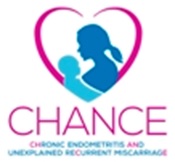CHronic endometritis ANd unexplained reCurrent misscarriagE: the role of the endometrial microbiome
Background:
Many people want to become parents. Unfortunately, 5% of couples experience recurrent miscarriage – defined as two or more miscarriages in a row. In more than half of these cases no cause is found.
This has a significant psychological impact on couples and uses many NHS resources. We do not know how to treat women with unexplained recurrent miscarriage and currently only offer supportive care.
A suggested cause of recurrent miscarriage is persistent inflammation of the womb lining. This is known as ‘chronic endometritis’. It may result in an unhealthy environment for an embryo. Chronic endometritis cannot be detected using regular tests; it requires examining a sample of the womb lining in a laboratory. Studies that previously investigated chronic endometritis as a potential cause of recurrent miscarriage are of poor quality and therefore National and International guidelines, The James Lind Alliance, and national miscarriage charities have prioritised this area for research.
Aim:
To identify whether women with recurrent miscarriage are more likely to have chronic endometritis than women without recurrent miscarriage, and to identify any bacteria that might be responsible for chronic endometritis. Furthermore, we will investigate if chronic endometritis could cause recurrent miscarriage by changing the distribution/function of cells in the womb lining.
Methods:
We will collect a sample of the womb lining from 100 women with a history of recurrent miscarriage and from 100 women who have had a successful pregnancy and no history of recurrent miscarriage (a control group). The control group (as approved by our patient advisory group) will be women undergoing planned “key hole” surgery for another reason but which allows easy sampling of their womb lining too.
If our study shows that chronic endometritis is a likely cause of recurrent miscarriage, we will carry out another study to see if treating chronic endometritis, with targeted antibiotics, increases pregnancy rates. Effective treatment would improve outcomes for our patients and save the NHS and society costs associated with recurrent miscarriage.
The study has been co-designed by women and their partners. Our patient advisory group will also be integral throughout the delivery of the study; from leading the preparation of patient facing documentation, to reviewing any changes made to the study protocol and co-dissemination of our findings through links with Tommy’s charity and The Miscarriage Association.
Sharing the results:
Our findings will be presented through national miscarriage charity events and national and international medical conferences. Our results will be published in health journals and freely available to the public. We will work closely with the relevant NHS and professional organisations to ensure that our findings are meaningful and widely and appropriately disseminated.
Study Timeline:
The study started on 01st April 2019 and will end on 31st March 2021.
